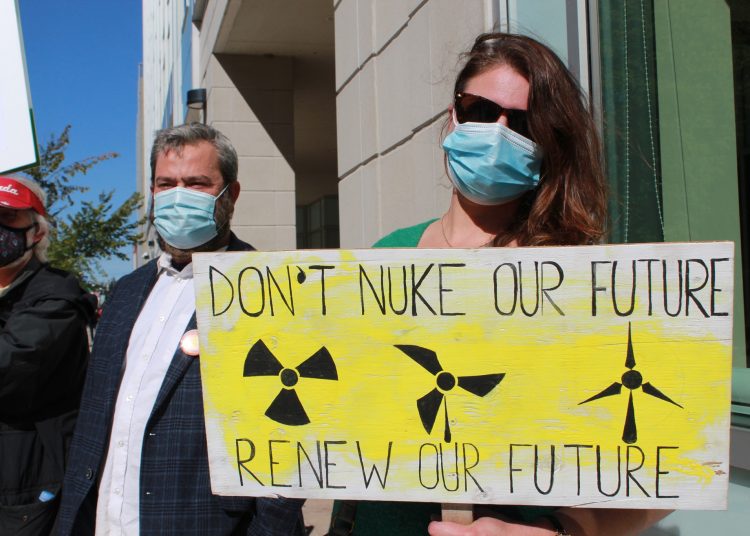As many countries scramble toward a net-zero future, some are betting on nuclear energy to reach their goal. However, a quiet but profound gender divide is growing around nuclear energy.
While nuclear power is often hailed as a critical tool in the climate fight, a growing body of research suggests that fewer women than men support nuclear power. This divide can be explained by safety concerns, ecofeminist ethics of care, and the nuclear industry’s macho culture.
The striking gender divide is another reason to question the viability of nuclear energy to attain climate justice and energy democracy.
Despite the foundational contributions of female scientists to the nuclear field (think Marie Curie, Lise Meitner, and Chien-Shiung Wu) the industry is currently male-dominated. According to a recent international report, women make up only 25 per cent of the nuclear workforce. Among new hires, 28.8 per cent are women, reflecting slow progress. Of that, a mere 18.5 per cent hold leadership roles.
Meanwhile, public opinion surveys spanning 20 countries show a persistent gender difference in support for nuclear energy. Women are consistently more skeptical than men, and not just marginally so. The gender divide is greater for nuclear technology than for any other energy source. Women cite safety risks and the potential to delay the rollout of renewable energy as primary reasons for their lack of support for nuclear energy.

Their concerns are justified. Studies show women are twice as likely to develop radiation-related cancers, yet safety regulations often rely on the so-called “Reference Man” standard, ignoring biological differences. Initiatives like the Gender and Radiation Impact Project are now working to redefine safety metrics using the “Reference Girl,” highlighting the systemic underrepresentation of women in regulatory science.
Indeed, more and more attention is being placed on the lack of female representation in science and society. Books like Unwell Women, Invisible Women, and Feminist City recount these enduring systemic misrepresentations.
The nuclear industry has noted the low female support. A 2023 report by the Nuclear Energy Agency declared the gender gap an “existential challenge” for achieving climate targets. One of its key recommendations? Attract more women through targeted communication campaigns.
The response has been… complicated. Enter the “nukefluencers”: social media-savvy women – many of them models and beauty queens – paid by the nuclear industry to tout the supposed benefits of nuclear power on Instagram and TikTok.
Posts often blend lifestyle content with pro-nuclear messaging, echoing the corporate “girl boss” ethos. But while these accounts aim to appeal to women, a brief analysis reveals that most engagement comes from men. It raises the question: who is this campaign really reaching?

Ecofeminist ethics offer another possible explanation for women’s reluctance to support nuclear energy. This perspective ties environmental degradation to systems of patriarchy and domination, arguing that the same forces that exploit nature also marginalize women, Indigenous peoples, and racialized communities.
Women, therefore, may be more attuned to nuclear energy’s ethical and social implications. Research shows women are 2.5 times more likely to demand climate action and that women-led companies tend to have stronger climate performance.
The “macho mentality” embedded in nuclear culture is another reason. Nuclear power is often portrayed in the media as powerful and dangerous, tapping into masculine ideals. From post-apocalyptic video games to radioactive superheroes, pop culture reinforces the narrative of nuclear as bold and aggressive.
In contrast, renewable energy is frequently associated with care, sustainability, and cooperation – all traits traditionally coded as feminine and therefore undervalued in male-dominated spheres.

Even nuclear industry branding can reflect this gender divide. Some nuclear companies employ harsh, bold typography and stark color schemes that psychological and communications studies believe subconsciously project strength and authority, often masculine traits.
Others, like the nuclear companies in New Brunswick, are attempting to greenwash their image with soft fonts, green logos, and lowercase letters, perhaps in a bid to court a more gender-diverse audience. Ironically, this might alienate men, who may perceive these aesthetic cues as less aligned with masculine identity.
You might think a simple change of font would not have the power to deter men, but studies have shown that men are more concerned with gender-identity maintenance than women and simple things like fonts can deter men due to the risk of harming masculine perception.

Nuclear energy’s gender divide is interwoven in many different ways, but the implications remain far-reaching. If nuclear expansion continues to ignore gendered perceptions and safety concerns, it risks exacerbating conflicts rather than resolving them. Climate justice and social justice are interlinked, ignoring one will equally harm the other.
If we want real change, we need women and other marginalized groups at the decision-making tables. If women are reluctant to support nuclear energy, their reasons need to be understood. Their voices against nuclear energy are important and need validation.
More than just a public opinion gap, the nuclear gender divide is a signal that the future of energy must be inclusive, equitable, and just. Without considering the concerns of women, no technological solution, however potentially powerful, will be truly sustainable.
Emma Fackenthall is a research assistant with the CEDAR project at St. Thomas University. She will be presenting a version of this research in Montreal this May at The Great Transition event.




![Researcher presents renewable energy plan for the Maritimes [video]](https://nbmediacoop.org/wp-content/uploads/2025/12/Ralph-Torrie-video-clip-350x250.jpg)


![NB Update: What comes after the crisis in local journalism? [video]](https://nbmediacoop.org/wp-content/uploads/2025/06/LabourUpdateApr132025-120x86.jpg)


